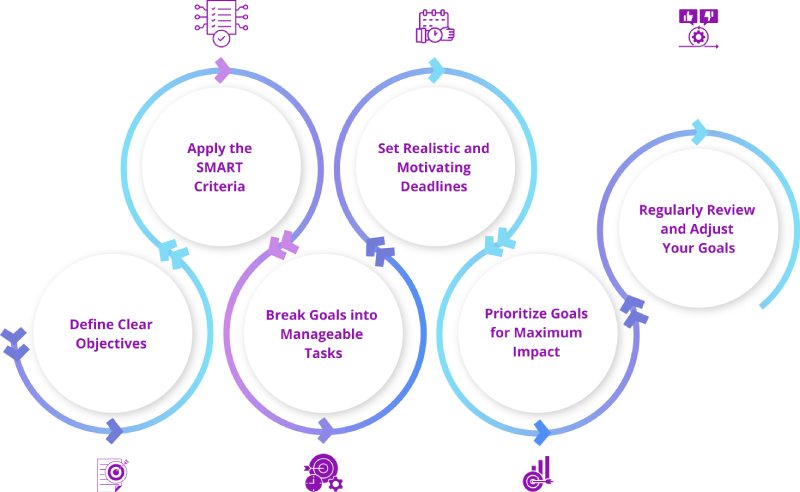Ever wondered why some people seem to accomplish so much while others struggle to keep up? The key often lies in effective time management. Are you making the most of your time each day, or are you finding yourself overwhelmed by endless tasks and deadlines? Setting clear time management goals can transform your daily routine, offering a structured approach to help you stay focused and productive. By defining what’s most important and organizing your schedule accordingly, you can turn chaos into order and ensure your time is spent on what truly matters. Let’s explore how these goals can streamline your workflow and boost your productivity.
What are Time Management Goals?
Time management goals are clear objectives that help people in planning and scheduling their work and other activities to achieve the best results. These goals offer a clear structure for approaching day-to-day tasks and long-term objectives, guaranteeing that time is properly utilized to achieve specific objectives and improve efficiency.
Crafting Effective Time Management Goals
Time management goals are like creating a plan on how the time is going to be used most effectively. It is not about writing down things to do but, it is about designing a system that guides you to get the right things done. Now, let’s discuss how you can set goals that will have a positive impact.

1. Set Precise Targets
The first key to goal setting in time management is to establish clear objectives. This entails identifying what you want to accomplish and why it is relevant. Specific goals give a sense of direction and meaning, which in turn helps to avoid getting lost and demotivated. When goals are clear, it is easier to track progress and ensure that you are on the right track towards achieving the set goals.
2. Apply the SMART Criteria
Use the SMART criteria (Specific, Measurable, Achievable, Relevant, Time-bound) when setting time management objectives. Specific goals are clear and precise, measurable goals enable one to quantify the results, achievable goals are realistic, relevant goals are in line with the overall objectives, and time-bound goals have set time frames. Using SMART criteria makes the goals realistic and achievable, which enhances time management.
3. Break Goals into Manageable Tasks
Dividing the goals into smaller achievable targets can reduce stress and make the goals more realistic. This method enables you to work at a gradual pace and is easier for time management. Every task is a part of the overall goal, which makes the process more organized and easier to accomplish.
4. Set Realistic and Motivating Deadlines
Set achievable goals and time frames so that you are not discouraged or overwhelmed. Ensure that deadlines are realistic yet challenging, offering the right balance of motivation. Scheduling deadlines are useful to keep you on track and ensure that you stick to the time management plan within the set time frame.
5. Prioritize Goals for Maximum Impact
Note that not all goals of time management are the same. Chasing your goals helps in making sure that the most crucial activities are accomplished. It is possible to achieve much and obtain measurable outcomes when you concentrate on the most important objectives. This approach is useful in time management since efforts are focused on what is important.
6. Regularly Review and Adjust Your Goals
Lastly, revise and adjust the goals and objectives of time management occasionally to check whether you are on the right track or not. This entails assessing the performance, identifying the difficulties, and making changes if needed. It is also necessary to mention that goals should be reviewed from time to time to evaluate the possibility of their achievement and relevance to the existing conditions.
10 Strategic Time Management Goal Examples for Success
This quote by Idowu Koyenikan ‘Time management is life management’ captures the whole idea of managing time for productivity. It is thus necessary to establish specific and realistic time management objectives to excel in your daily and professional life. Here are ten examples that will help you in time management and the achievement of your goals.
1. Prioritize Daily Tasks
-
Begin your day by writing down tasks in the order of their importance. This approach assists you to prioritize your work and give the important tasks the attention they require.
-
Learn to manage your time in a way that you do not get exhausted before accomplishing important tasks. Dealing with such items first assists in establishing a positive work culture and avoids getting stressed by the upcoming due dates.
-
Categorize tasks based on the Eisenhower Matrix that divides tasks into urgent and important ones. This method enables you to prioritize urgent and important tasks, thus enabling you to work more efficiently.
2. Limit Social Media Usage
Social media is a major distraction. To manage distractions effectively, set specific times during the day to check your social media profiles. For instance, you might decide to spend 15 minutes in the morning and another 15 minutes in the evening. This way, you do not have to keep on pausing your work to attend to notifications and can work for longer periods. This simple strategy can go a long way in increasing productivity by a significant margin.
3. Utilize Visual Management Tools
-
Use project management tools such as Gantt charts, Kanban boards, and flowcharts to organize multiple tasks and projects. These tools provide a good picture of the progress made and the interrelatedness of tasks.
-
Gantt charts are useful in showing the sequence of events and their relationship to other events in a project and thus assist in time management.
-
Kanban boards help in tracking the progress of tasks and in the identification of constraints. This way, you can track the flow of tasks using columns like “To Do,” “In Progress,” and “Done.”
-
A flowchart shows the flow of a process and how different tasks are related, which improves your capacity to manage a project.
4. Conquer Procrastination
-
Combat procrastination by dividing large tasks into smaller parts that can be easily accomplished. This approach makes the goals of time management seem more realistic and less overwhelming.
-
Break down the large tasks into subtasks with timelines that are easier to manage. For example, if you have a product launch, make a timeline with the subtasks such as writing the product description, developing the marketing assets, and posting on social media.
-
Employ time management tools to track progress and ensure that the tasks are completed on time. This helps each subtask be accomplished on time and in achieving the goals of time management.
-
Complete each subtask linearly to ensure constant progress. In this way, you control the time and gradually complete the work, which contributes to achieving the set objectives.
5. Set Aside for Time Breaks
-
It is important to take breaks during the working day to avoid getting tired and low productivity. Strategic goals of time management include taking breaks in between to avoid getting tired and hence not being able to concentrate.
-
Use the Pomodoro Technique as a smart objective for time management. Work for 25 minutes and then take a break for 5 minutes. Take a longer break after four work periods have been completed.
-
Short and timed breaks are effective in helping one to relax and focus on the task at hand. In this way, you comply with the principles of time management and improve your skills in working effectively.
6. Delegate Tasks When Possible
-
List down activities that can be done by other people.
-
Delegation helps you save time, direct your energy towards more important issues, and help in proper work distribution.
-
Assigning tasks to your team not only helps you to reduce your workload but also helps to build your team and can often produce better results.
-
Delegation is a process that entails communication and confidence in your co-workers.
7. Establish a Morning Routine
Establish a good morning habit to ensure that you have a good start to your day. Include exercises that create a positive outlook towards the day, for instance, exercising, meditating, or mapping the day. Having a good morning routine can improve your concentration, make you more energetic and even improve your productivity. Waking up with a plan of the day’s activities ensures that you are productive from the onset and do not lose focus.
8. Set Specific Work Hours
-
Establish work schedules and adhere to them to the letter. This practice is useful in establishing a work-life balance since it allows one to have time for other activities apart from work.
-
Work-life balance is a key factor in the long-term sustainability of any business and its employees.
-
This way, you will be able to schedule your working hours and prevent yourself from getting burnt out.
9. Review Goals Regularly
It is also important to revisit and update the goals of time management as often as possible to ensure that they are in line with the priorities. It enables you to monitor progress and make the right changes that will suit the new conditions in the environment. Ongoing evaluation also helps to maintain the goals as realistic and challenging, thus encouraging the individual towards the accomplishment of the long-term objectives.
10. Learn to Say No
Learn when to decline other activities or assignments that do not relate to your objectives. It is always hard to say no, but it is important not to let yourself be pulled in too many different directions and to stick to what is important. When you know how to say no, you are protecting your time and your energy for what matters in your life.
Therefore, if you focus on what is important and schedule your time correctly, you will achieve your objectives with less effort and stress. These are examples you should embrace to regain control of your time and achieve your full potential.
Conclusion
Time management goals can change the way you work and live your life. When you set goals and objectives and use effective time management methods, you can manage your time and accomplish more with less pressure. Begin now and notice the change in your everyday life and future achievements.
Time Champ is one of the best time-tracking software that assists you in managing your daily tasks and increasing efficiency. In this way, Time Champ relates to the goals of time management and guarantees that every minute is calculated and used effectively. Whether you are working on a task list or a team performance, Time Champ is the perfect solution for reaching your goals and improving productivity.
Streamline your schedule with Time Champ
Try it now and take charge of your time effortlessly!
SignUp for FreeBook DemoFrequently Asked Questions
Goals for time management are useful in that they assist in the identification of tasks, their scheduling and enable concentration on the tasks at hand, thus increasing productivity and decreasing stress.
While time management goals are more specific and relate to how you manage your time and utilize it, personal goals are more general and refer to general life goals and accomplishments.
For the employees working from home, the time management goals include having a clear schedule of working hours, avoiding interruptions, planning and organizing the work, and taking breaks to avoid burnout.
Measures of time management goals can be achieved by observing the level of achievement of the laid down goals, evaluating the accomplishment of tasks within the stipulated time, and analyzing the changes in productivity and efficiency.





